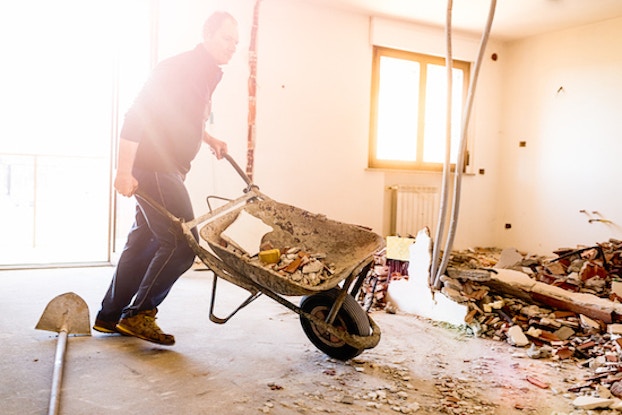
Think you can get by as a small business owner without commercial property insurance? Think again.
No matter what kind of company you are or where your office is located, accidents, fires, acts of nature, crimes and other events can happen that trigger losses — and the results can be devastating to your bottom line.
Property insurance applies to all businesses
Perhaps you don’t own that much equipment, or you don’t own your office building, or you may even work from home. Truth is, you still need business property insurance. There are still plenty of prospective perils that can harm your enterprise, regardless of these or other circumstances.
- Example 1: Say you rent office space in a building and decide to hang up a framed picture. You hammer a nail into the wall but aren’t aware that you’ve pierced a water pipe hidden behind the drywall. You return the next day and quickly discover that the walls, floors, electrical wiring of your office have suffered serious water damage. Your landlord demands remediation. But without commercial property insurance, you’re on the hook for thousands of dollars in losses. Plus, your landlord threatens eviction because you ignored the stipulation in your lease requiring business property insurance.
- Example 2: Suppose you’ve set up shop in your garage. A passerby flicks a stray cigarette butt into a nearby pile of leaves and soon your garage is engulfed in flames, destroying all your company equipment and assets to the tune of $15,500 in business-related losses. Your garage replacement costs are covered by your homeowners insurance policy; but, like most, it only includes business property coverage up to $2,500 in losses. Lacking a separate commercial property insurance policy, you end up paying $13,000 out of pocket.
Big coverage for big and small threats alike
Think of all the items housed within and around your office — equipment, furniture, fixtures, supplies and product inventory. A commercial property insurance policy will cover all these things from most perils, including fire, wind, hail, rain, snow, freezing or burst pipes, explosions, vandalism and theft. The building itself—whether you own or rent it —as well as the landscaping, fence, signage and other exterior elements usually come with the same protections.
[For more on business insurance, check out A Guide to Choosing the Best Business Insurance.]


“Many company owners mistakenly equate the word ‘property’ in business property insurance with just the land or building and not the contents inside that dwelling. Just because you don’t own your building, or think that you don’t have as great a need for insuring it or the land around it, doesn’t mean that you should go without commercial property insurance,” said certified financial planner Joel Ohman, owner of InsuranceProviders.com.
Even coverage for small claims can make a big difference, especially to a startup or hungry new entrepreneur.
Unforeseen property loss can quickly shutter a small business.
John A. Tillistrand, vice president of Commercial Lines and Risk Management for Sinclair Risk & Financial Management
Underrated and affordable
Despite its importance, you may be surprised to learn business property insurance can often be overlooked by owners of smaller businesses.
Here’s another surprise: Commercial property insurance isn’t expensive. A small business can expect to pay from $500 to $3,000 annually for this coverage, with the average policy costing $742 yearly. That’s a fraction of what you’d fork over to recover from many business-related property losses.
Consider what insurers compensate, on average, for some of their most costly claims, like fire ($35,000), wind and hail damage ($26,000), water and freezing damage ($17,000), and theft/burglary ($8,000); ponder, too, that the latter three perils are the most common property-related claims, comprising 50% of all property and liability claims filed.
“Many small businesses have a limited budget geared toward getting revenue flowing, and insurance is not typically at the top of their list of priorities. But unforeseen property loss can quickly shutter a small business,” said John A. Tillistrand, vice president of Commercial Lines and Risk Management for Sinclair Risk & Financial Management, a business insurance provider.
Keep in mind that it’s not just the damage to physical assets that can harm a business. Some companies learn the hard way that property losses can also destroy their reputations among clients, result in loan defaults, and lead to legal jeopardy if they’re sued for not paying bills on time.
No policy is perfect
However, although commercial property insurance is fairly comprehensive, it isn’t bulletproof. There are some items and events it will not protect.
“These policies typically do not cover water damage from flood, seepage of water, sewer backup, sewer backup, earthquake damage, wear and tear, intentional illegal actions, employee criminal acts, or fraud,” Tillistrand said. “To safeguard against these or other perils, you may need to purchase a rider or additional coverages, offered as options by insurers.”
Additional coverage may also be required for losses incurred by disrupted electrical service, as well.
“If you have a restaurant, caterer or other foodservice business, you could easily lose $25,000 due to food spoilage as a result of a day-long power outage, so this coverage is worth it for these and other types of companies,” said Donna Childs, founder and CEO of Prisere LLC and author of “Prepare for the Worst, Plan for the Best: Disaster Preparedness and Recovery for Small Businesses.”
To get the best policy for your small business needs, shop around for insurers carefully, get several quotes, and “discuss all included and optional coverages with your agent prior to making a buying decision,” said Ohman.
CO— aims to bring you inspiration from leading respected experts. However, before making any business decision, you should consult a professional who can advise you based on your individual situation.
CO—is committed to helping you start, run and grow your small business. Learn more about the benefits of small business membership in the U.S. Chamber of Commerce, here.




